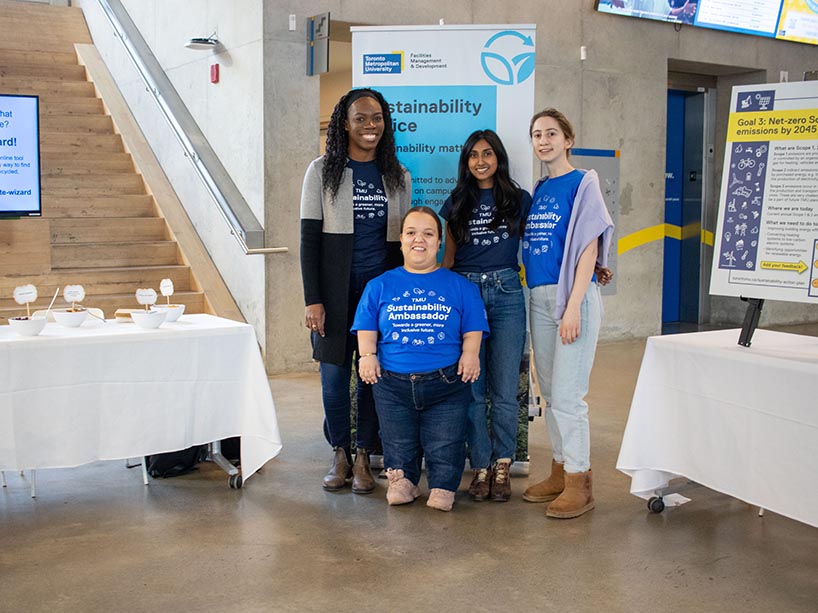Charting a greener future: inside TMU's first Sustainability Action Plan

Along with three long-term goals, the Sustainability Action Plan identifies five priority areas of impact to implement targeted climate action.
Toronto Metropolitan University (TMU) has released its first Sustainability Action Plan with three key goals: achieving a platinum STARS sustainability rating (external link) by 2035, a zero-waste campus by 2035 and net-zero scope one and two emissions by 2045.
The five-year plan provides a roadmap for the university community to build a more sustainable future that is inclusive, equitable, prosperous and ecologically balanced. After extensive community participation, the action plan was created by TMU community members, for TMU community members. It reflects the perspectives and aspirations of university students, faculty and staff while advancing the institution’s vision to be a leader in restorative climate action and environmental recovery.
“In the face of the escalating climate crisis, this Sustainability Action Plan is a necessary roadmap to tackle urgent sustainability issues head-on with clear goals for collective action,” said Sharmilla Raj, manager of sustainability at TMU. “We need a unified approach to make meaningful and measurable progress. The report’s guidance empowers individuals to be drivers of positive change for a greener, more equitable and inclusive TMU.”
As a leader in higher education that is committed to tackling real-world challenges, TMU’s Sustainable Action Plan is one way that the university is contributing to the United Nations Sustainable Development Goals (external link) (SDGs) for ending poverty, protecting the planet and tackling inequalities.
“Our Sustainability Action Plan is tailored to TMU's urban context. Our downtown Toronto location means we are uniquely positioned to collaborate with the city and other partners,” said Saeed Zolfaghari, the university’s vice-president, administration and operations.
“We can leverage our location to test and implement scalable solutions for urban sustainability challenges. This strategic advantage allows us to pioneer innovative initiatives that not only benefit our campus, but also contribute to broader environmental preservation and restorative efforts.”
Three long-term goals
The Sustainability Action Plan sets three long-term goals that will guide planning and action over the next five years. These goals were identified because they align with institutional values, insights from the community, benchmarking data, adherence to best practices, government targets and global perspectives.
“To accomplish these objectives, our plan advocates for a holistic approach including infrastructure enhancements, policy adjustments and behavioral shifts,” said Raj. “It outlines meaningful actions, both large and small, that drive progress and key partnerships integral to successful implementation.”
The Sustainability Tracking, Assessment & Rating System (STARS (external link) ) is widely used by colleges and universities to benchmark their sustainability progress. The rating is built around four categories: academics, operations, planning, administration and engagement.
A Platinum STARS rating indicates that an institution not only meets the highest scores in recognized best practices, but has also demonstrated that it has developed actionable strategies for continuous improvement in climate action and social equity. TMU’s current STARS ranking is Silver with a score of 54.26.
A zero-waste campus is one with a waste diversion rate of 90 per cent or higher. TMU’s waste diversion rate has hovered around 40 per cent over the past seven years.
The university has made significant efforts to increase awareness on waste sorting habits, improve waste infrastructure on campus and promote waste-source reduction, resource recovery, reuse and circularity.
Still, increased participation from the campus community is needed to meet TMU’s waste diversion goals. Improvements to the centralized waste program, construction and demolition waste reduction, expanding resource recovery, reuse and circularity programs, and sustainable purchasing policies are also important.
Net-zero emissions are crucial in combating climate change and nurturing the planet for future generations. To effectively limit global warming — and the economic volatility and climate instability it causes — immediate and aggressive emission reductions are needed worldwide.
This goal involves improving building energy efficiency, converting heating systems to low-carbon electric heat pump systems, and identifying opportunities for renewable energy, such as geothermal and wastewater heat recovery.

Data and insights gained from a comprehensive community consultation process played a pivotal role in shaping the action plan. From left: Erica Wilkinson, sustainability coordinator, Mona Hafez, sustainability research intern, Sharmilla Raj, sustainability manager and Nour Aboulwafa, sustainability ambassador.
Five areas of impact
The Sustainability office worked with the university’s Climate Change and Sustainability Advisory Committee to identify five priority areas where targeted initiatives can help meet the goals outlined in the action plan. These areas of impact are: academics, research and innovation, university operations, planning and administration, and community engagement and partnerships.
Within university operations fall key components of campus life such as buildings and utilities, grounds and ecosystems, waste and circular materials management, transportation, food and dining, and procurement.
“In developing this plan, we took a deeper look at how we can most significantly contribute to sustainable development through our activities and operations,” Raj explained.
“This includes developing guidelines for sustainable purchasing, enhancing energy efficiency in existing campus buildings and behavior-change initiatives to help our students, faculty and staff succeed,” said Raj. “Work on building systems and campus operations has already begun and we are equipping community members with the tools and resources needed to drive meaningful change across campus and within the environments we share.”
A collective responsibility
One of the key features of TMU’s Sustainability Action Plan is collective action. It highlights how we can make adjustments to ways of thinking and habits at all levels of the university. Community engagement was crucial in developing the plan to embody the university’s values, gather diverse perspectives, foster ownership and ensure transparency.
The community outreach process included a sustainability action planning survey that aimed to understand existing sustainability practices, habits and levels of awareness among community members. This initial campus-wide survey received 2,417 responses.
The Sustainability Office also partnered with Generation Climate (external link) , a youth-driven initiative focused on climate-action awareness. Over the course of one week, they engaged with around 100 TMU students to gauge their perspectives on sustainability and environmental initiatives.
Engaging with community members revealed five high-priority areas for TMU students, faculty and staff: reduce waste, create a greener campus, increase recycling and composting, develop a climate action plan to reduce greenhouse gas emissions, and ensure sustainability criteria are included in university purchasing decisions.
“For young people, advocating for sustainable practices and addressing environmental injustices directly impacts their future well-being and the health of the planet they will inherit,” said Mona Hafez, a fourth-year engineering student and sustainability research intern at TMU. “Simple actions such as using cold water to wash your clothes and dishes, minimizing waste, choosing eco-friendly products, supporting sustainable brands, and advocating for policy changes can collectively contribute to a healthier planet and a more sustainable future.”
To learn more about the university’s goals and how each of us can integrate sustainability practices and climate action into our daily lives to make meaningful change, explore the Sustainability Action Plan report.